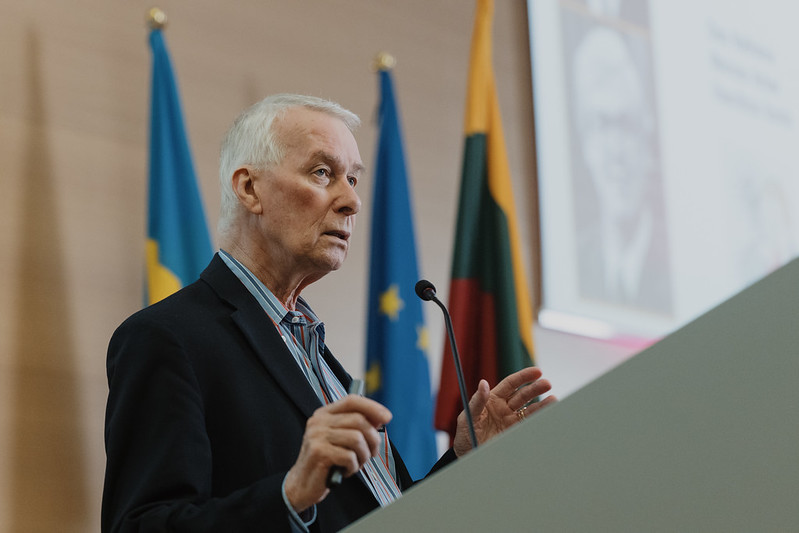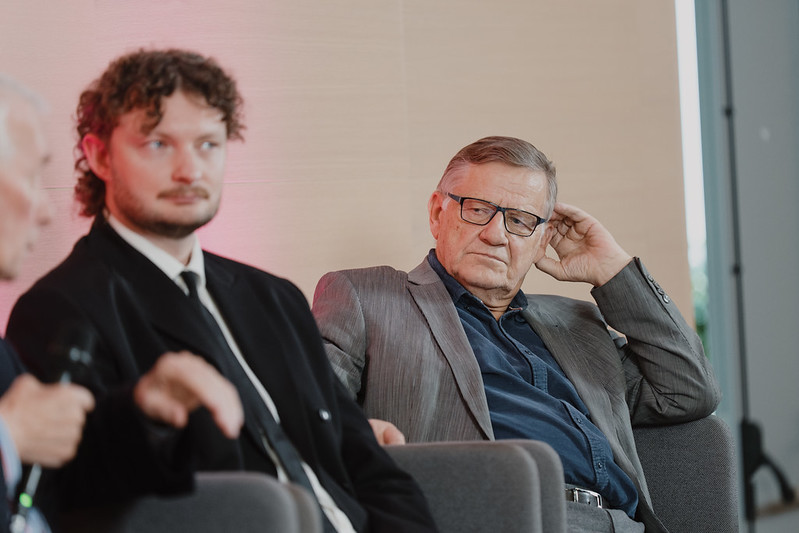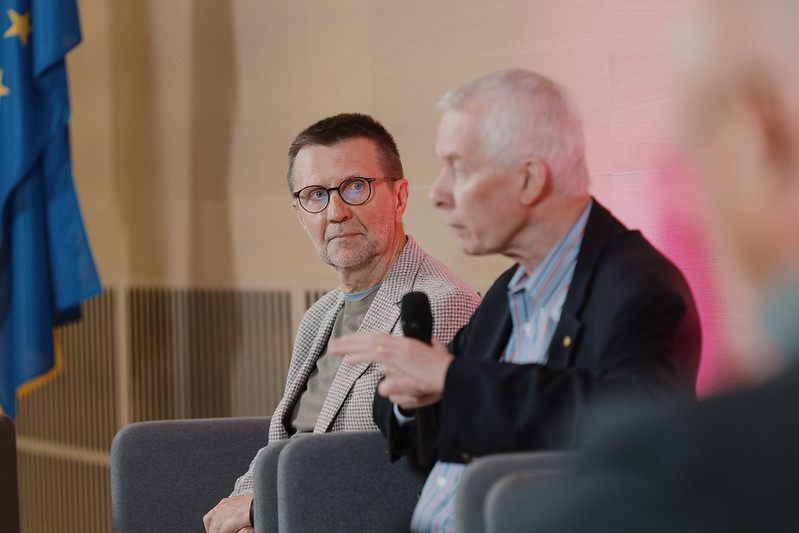From Personalised Medicine to Global Discoveries: A Discussion on Biotechnology During the Visit of a Nobel Laureate

The rapid development of biotechnology in Lithuania has been driven by dedicated scientists eager to make new discoveries, says Professor Virginijus Šikšnys, one of the pioneers of CRISPR gene-editing technology. He shared these thoughts during the visit of Sir Richard John Roberts, Nobel Laureate in Physiology or Medicine, to Vilnius University (VU). At the discussion titled ‘Breakthroughs in Biotechnology: How Do They Emerge and How Do They Change Our Lives’, scientists explored the significance and future of personalised medicine, as well as other topics related to advances in biotechnology.
‘I think the only reason biotechnology has thrived in Lithuania is thanks to dedicated people who were interested in developing new things and exploring new paths in their research careers,’ noted Prof. Šikšnys.
The importance of personalised medicine
Advances in biotechnology are particularly evident in the field of personalised medicine, where individual genetic data becomes the basis for more precise and effective treatment. As explained by Prof. Arvydas Janulaitis, founder of the Future Biomedicine Foundation, traditional practical medicine relies on studies conducted with large population groups: ‘For instance, a diagnosis of breast cancer is often regarded as the same in every patient, but in fact each case differs at the molecular level.’

According to the researcher, modern personalised medicine seeks to understand these differences and tailor treatments to each individual based on their unique molecular profile: ‘This is fundamentally transforming the entire healthcare system – from treatment to disease prevention, prognosis, and more.’
Prof. Šikšnys highlighted a notable example of personalised medicine: a baby born with a rare and fatal genetic condition. This year, the child became the first person in the world to receive CRISPR gene-editing therapy.
‘Scientists were able to develop genome-editing tools specifically designed to address this mutation and cure the baby. This is the future of medicine – each of us will be treated as a unique case, with individually tailored therapies,’ said the Professor.
While presenting the plans of the Ministry of Health, Vice-Minister Danielius Naumovas revealed that €20 million will be allocated for the personalised medicine programme. According to the Vice-Minister, scientific research will receive higher-than-usual funding: ‘We also plan to amend the Law on Ethics of Biomedical Research, as we aim to create more favourable conditions to facilitate faster biomedical research.’
Sir Richard J. Roberts emphasised that progress in personalised medicine will eventually require having every individual’s DNA sequence.
‘Ultimately, if we’re going to do personalised medicine, we need everybody’s DNA sequence. If we get your DNA sequence when you’re born, first of all, we can look and see if there are some genes that might cause a problem later in life, and we can get prepared for it. And it is getting incredibly cheap now to get complete DNA sequences. It’s not perfect yet, but I think it is not going to be too long before it will be very inexpensive to get a good, complete sequence that will tell us everything we need to know,’ explained the Nobel Laureate.
According to him, a far greater investment of time and resources will be required to understand exactly what specific genes do and how they affect people during their lives.
Speaking about the ethical issues raised by personalised medicine, Prof. Šikšnys gave an example: ‘I recently attended a meeting with a scientist from the Massachusetts Institute of Technology; she carries an extremely rare genetic mutation associated with a prion disease that also affected her mother. She has seen what happened to her mother, and although she is currently perfectly healthy, she knows what awaits her in 50 years.’
To treat this specific mutation, the US scientist began developing drugs based on CRISPR technology.
‘However, when she approached the authorities, they were surprised – after all, she was suggesting treatment for a healthy individual, with no symptoms present yet. This raises very important ethical questions,’ stated Prof. Šikšnys.
Pursuing a career that brings happiness
The scientists who participated in the discussion also talked about advanced microfluidic technologies. According to their developer, Dr Linas Mažutis, these technologies allow millions of reactions to be performed with individual biomolecules and extremely small sample volumes.
‘For example, in cancer, metastasis (spreading) often begins from single cells. To understand the biological mechanisms of these complex diseases, or even to find potential treatments, it is crucial to understand what triggers the initial changes in an individual cell. Microfluidic technologies have played a vital role here, as they allow researchers to analyse individual cells separately and examine their genetic profiles in detail, which was not possible before,’ explained the scientist.
When asked about the impact of receiving the Nobel Prize on his research, Sir Richard J. Roberts said that such recognition demonstrates the value of fundamental research. Prof. Šikšnys agreed with him:
‘The discovery of CRISPR technology is the best example proving the importance of basic research. It was discovered while trying to answer the very basic biological question – how bacteria defend themselves against viruses – and no one was thinking about genome editing at the time,’ he said.

Sir Richard J. Roberts’s name is etched in the history of science for a discovery that fundamentally transformed our understanding of genes and genetic information. His 1977 study demonstrated that eukaryotic genes (in humans, animals, plants, and other organisms) contain introns (non-coding DNA sequences), and that their removal (splicing) is an essential part of gene expression. As a result, a single gene can produce multiple different proteins, and gene expression is far more complex than previously thought. Together with his colleague Phillip Allen Sharp, Sir Richard J. Roberts was awarded the Nobel Prize in Physiology or Medicine in 1993 for this ground-breaking discovery.
At the end of the discussion, the Nobel Laureate recommended choosing a career that brings happiness:
‘People who are happy in their job don’t recognise that they work. I don’t think I’ve worked a day in my life because I enjoy what I do every day. Don’t be afraid to change. If you find something that is more interesting than what you’re doing at the moment, don’t be afraid to switch,’ advised Sir Richard J. Roberts.